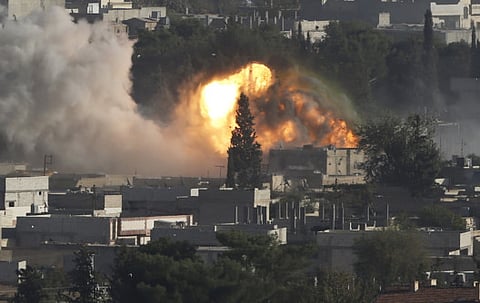From empires to statelets
The world is likely to experience an explosion of new states

A few weeks ago, voters in Scotland rejected independence by 55 per cent to 45 per cent, after a bitter campaign that aimed to end what many perceived as one of the longest occupations in human history. To avoid a similar outcome, the leader of Spain’s Catalonia region, Artur Mas, called off a referendum on independence from Spain scheduled for November 9, with news that Esquerra Republicana de Catalunya, the pro-independence party, offered to look for alternative ways to consult Catalans. Belgium, Iraq, Syria, Lebanon, among so many countries, faced similar challenges as sustained efforts to split manufactured states, republics, constitutional monarchies, federations, kleptocracies, confederations, to name just a few systems, gained momentum.
What appeared as relatively harmonious nation-states — 206 at last count, although only 193 were formal members in the United Nations, while two (Vatican and Palestine) enjoyed observer status and 11 fell in the undetermined category (Abkhazia, Cook Islands, Kosovo, Nagorno-Karabagh, Niue, Northern Cyprus, Sahrawi Arab Democratic Republic, Somaliland, South Ossetia, Taiwan and Transnistria) — were, in fact, under duress. Is the world likely to see an explosion in the number of new independent states or, on the contrary, will we return to pre-Second World War dimensions?
Harmonious coexistence is of course a lofty goal, though human beings have had a whale of a time to date. With rare exceptions — Czechoslovakia (1918-1993) broke up in 1993 into the Slovak and Czech republics somewhat peacefully — most of the divisions were bloody affairs that tore nations apart and perpetuated violence. India and Pakistan, Sudan and South Sudan, the two Koreas, China (Taiwan, Tibet, Hong Kong and other entities), a myriad of African nation-states with mixed opposing tribes, and even major powers like Brazil, Russia, the US and Mexico were all products of serious confrontations that resulted in deaths and mayhem galore.
Such divisions gained momentum in the 19th and 20th centuries when the Austro-Hungarian, Ottoman, Russian, French and British empires collapsed, to give rise to numerous states ostensibly committed to peace. Often, major powers drafted secret agreements to redraw maps, create artificial statelets and secure allies when they knew all too well the latter’s unreliability. It was convenient and, in the race of nations, amply justifiable though it now looks that the experiments were premature. The schemes eroded over time as nationalism settled and, with increased education as well as denied opportunities, the preference was to seek political divorces if possible. Alternatively, nations opted to fight for independence when all else failed and that, in our part of the world, led to catastrophes.
Of course, sectarian clashes and civil wars, like the ones we now have in Iraq and Syria — with a soft variety in Lebanon — threatened to divide these countries into three or more entities. Consequently, we should not be surprised when cultural differences translate into contradictory political visions, which are often camouflaged under religious rhetoric since the latter is a far better rallying point among gullible populations.
Regrettably, Iraq and Syria seem programmed to implode unless effective federal systems are created, while Lebanon is most likely impossible to save in its present form because its citizens feel no compunction to allow foreign powers to pile on their domestic woes. To be sure, Beirut was a relatively successful democratising entity that created wealth and allowed all of its citizens to thrive and while significant injustices led to profound psychological splits, the country has not recovered from the festering 1975-1990 civil war. Still, current uncertainties were more of an elite struggle for power than a concrete illustration of popular resentment and, for all of their shortcomings, the Lebanese were willing to coexist even if few were willing to empower existing institutions to impose law and order.
There is a reverse phenomenon worthy of attention too. Namely, the decision by several independent states to form a union, a project that was partially fulfilled in Europe and was under discussion by the conservative Arab Gulf states. With the exception of Oman, that voiced its opposition to such a scheme, the Gulf Cooperation Council (GCC) union plan proposed to join forces and protect member-states from perceived foreign incursions on the Arabian Peninsula. According to the Kuwaiti thinker, Abdullah Al Nafisi, the very survival of the GCC states could only be assured if the six independent countries integrated into a single political entity with Madinah, in Saudi Arabia, as its capital. Though this is not a done deal by any stretch of the imagination, Al Nafisi’s ideas are not as far-fetched as many assume, given the regional challenges. Of course, the GCC is a unique case because of so many similarities amongst its populations and systems of government, even if global trend goes the other way.
The chief argument made by governments confronted with the independence conundrum hovered around the notion that no single group should make decisions on sovereignty that could potentially affect an entire society. Rather, the preference was on referenda or consultations between nascent parties that sought independence with ruling parties. That was certainly correct because the need for popular backing was imperative, even if a referendum contained the risk of rejection — as was the case in Scotland or may have been the situation in Catalonia.
Nevertheless, citizens who feel ostracised in their own countries push for disassociations from existing political systems, which is also a valid proposition. Under the circumstances — and with eroding confidence that authority can be implemented with justice — the world is likely to experience an explosion of new states that, for better or worse, promise to change the international system as we know it today. That, too, should come as no surprise.
Dr Joseph A. Kechichian is the author of the forthcoming Iffat Al Thunayan: An Arabian Queen, London: Sussex Academic Press, 2015.
Sign up for the Daily Briefing
Get the latest news and updates straight to your inbox


